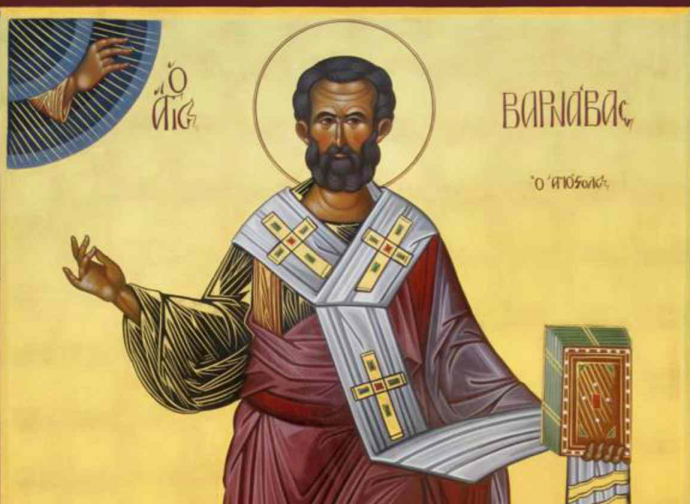Saint Barnabas
According to tradition, he was in the group of 72 disciples sent by Jesus to announce the Kingdom of God

Although not one of the Twelve, Saint Barnabas has always been venerated as an apostle and so called in the Acts of the Apostles, alongside Paul (Acts 14:14), because of the important role he played in the early Church. Saint Luke, who often mentions him, introduces his figure in the fourth chapter of Acts, where he speaks of the communion of goods and hearts of the early Christians. We know from here that the saint, a Levite originally from Cyprus, was called Joseph. It was the apostles who nicknamed him Barnabas, which means “the son of Consolation”, who “owned a field, sold it and delivered the amount to the apostles' feet” (Acts 4, 36-37).
Barnabas probably knew the Lord on earth. According to tradition, reported in the Ecclesiastical History by Eusebius of Caesarea (c. 265-340) - based in turn on the writings of Clement Alexandrine (c. 150-215) who gave it for certain - Barnabas was in the group of 72 disciples sent by Jesus to announce the Kingdom of God (Lk 10, 1-24). Moreover, the Acts show the great consideration he enjoyed in the Church. After Paul's conversion and his coming to Jerusalem, the other disciples were still afraid of the former persecutor who had courageously announced Jesus Christ in Damascus. It was Barnabas himself who took Paul with him and presented him to the apostles, and from that moment Paul “could be with them and came and went to Jerusalem, speaking openly in the name of the Lord” (Acts 9: 26-28).
When news arrived of the great number of conversions that had taken place in Antioch among both the Jews and the Gentiles, the Church of Jerusalem sent Barnabas to verify. And he, noting the abundance of graces poured out by God on that city, “rejoiced and, as the virtuous man that he was, and full of the Holy Spirit and faith, exhorted everyone to persevere with a resolute heart in the Lord”. Shortly afterwards he went in search of Paul to take him to Antioch, where the two stayed together to preach for a whole year and where a historic event took place: “In Antioch the disciples were called Christians for the first time” (Acts 11:26). In times of famine it was he and Paul who took the fruits of a collection to the brothers in Judea, from where they left for Antioch, taking with them the future evangelist Mark, Barnabas' cousin. At the prompting of the Holy Spirit (Acts 13:2), they then went to evangelize Cyprus. From there they travelled to Pamphylia, where Mark’s separation from them took place.
Paul and Barnabas continued their mission together in various cities of Asia Minor, including Lystra. It was here that Paul miraculously healed a man whose legs had been paralyzed from birth, and the inhabitants called out “Barnabas Zeus and Paul Hermes”: the two had to shout to make the crowd desist from offering sacrifices in their honour, urging them to convert to the true God. Around the year 50 they took part in the Council of Jerusalem, where they agreed with the apostles that circumcision should not be imposed on the converted pagans. A few days later the two separated because of the quarrel over Mark: Barnabas wanted him to leave with them, while Paul, recalling the previous separation, did not think it appropriate. Barnabas left again for Cyprus with Mark and later, as can be seen from Paul’s letters, reconciliation took place.
It is known from some Byzantine catalogues that Barnabas preached in Rome together with Peter. He then travelled to northern Italy, where he founded the Church of Milan, becoming its first bishop. According to tradition he began to travel again and was stoned to death by the Jews in his place of origin, Cyprus, in Salamis, around 61, while holding a copy of the Gospel according to Matthew.
Patron of: Cyprus, invoked against hail
